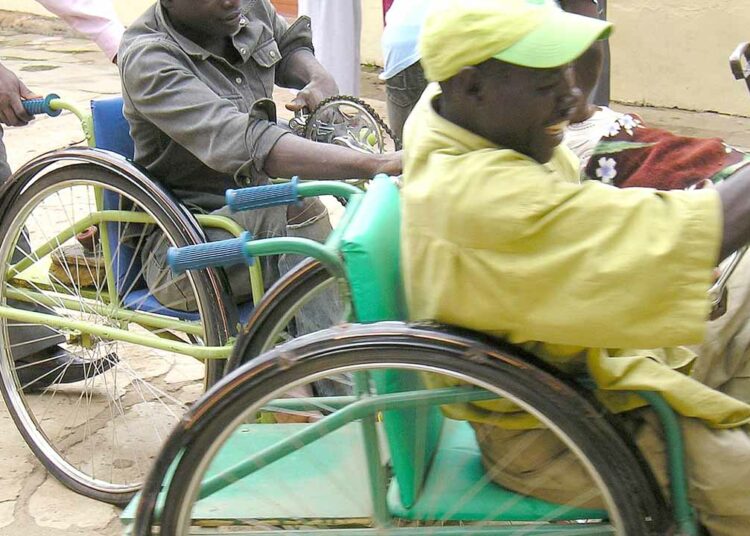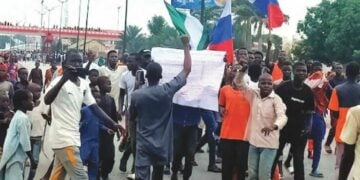Prior to 1992 when the United Nations Assembly, in Resolution 47/3, proclaimed December 3 as International Day of Persons with Disabilities(PWDs) those category of citizens received merely emotional attention.
That resolution which aims to promote an understanding of disability issues and mobilize support for the dignity, rights and well-being of persons with disabilities has made activities of the day assume the status of an international event. And rightly so.
It also seeks to increase awareness of gains to be derived from the integration of persons with disabilities in every aspect of political, social, economic, and cultural life.
The theme of this year 2023 International Day of Persons with Disabilities is: “United in action to rescue and achieve the SDGs for, with and by persons with disabilities”.
Following nine years of relentless advocacy by disability rights groups and activists, former Nigeria’s President Muhammadu Buhari signed into law, the Discrimination Against Persons with Disabilities (Prohibition) Act, 2018 in January 23.
The law prohibits discrimination on the basis of disability and imposes sanctions including fines and prison sentences on those who contravene it and also stipulates a five-year transitional period for modifying public buildings, structures, and automobiles to make them accessible and usable for people with disabilities.
The law also stipulates that (1) government shall guarantee that persons with disabilities have unfettered access to adequate health care without discrimination on the basis of their condition. (2) A person with mental disability shall be entitled to free medical and health service in all public health institutions.
The law also states that five percent of all political appointments should be allocated to PWDs.
Addressing issues relating to disability has remained a challenge to most countries including Nigeria. People with disabilities are confronted with problems in their day to day existence. They experience depression, social marginalization, and isolation.
Many persons with disabilities die earlier because they are at increased risk of developing a range of health conditions, and experience more limitations in everyday functioning than the rest of the population.
According to the World Health Organisation WHO), more than 1.3 billion people experience significant disability today, which represents 16 per cent of the global population.
The World report on disability published in 2011, said about 25 million Nigerians had at least one disability or the other, while 3.6 million of these had very significant difficulties in functioning.
As at 2020, there were reportedly over 27 million Nigerians living with some form of disability.
Findings showed that some of the challenges facing persons living with disabilities in Nigeria include, environmental, educational, and socio-economic as well as human rights abuses, stigma, discrimination and violence.
The National Commission for Persons with Disabilities (NCWD) was established in 2020, with the aim of preventing discrimination against persons with disabilities, and to make every one of them have equal rights and opportunities like their counterparts with no disabilities.
We are saddened that with a law that was celebrated with so much fanfare and hope for the welfare of persons living with disabilities , it’s implementation leaves much to be desired five years after.
To start with, the budgetary allocation to the National Commission for Persons with Disabilities is too low and quite abysmal to carry out its mandate in catering to the large number of persons living with disabilities in Nigeria.
In commemoration of the day, members of the federal legislature called for the establishment of disabilities trust fund at national and state levels insisting that disability laws that have been domiciled in states must be made operational.
But what is even more worrisome, in our view, is the fact that since the signing into law of the bill, only a few states have domesticated and implemented it.
The states that passed disability laws as at 2022, include; North Central (Kogi, Kwara, Nasarawa, Niger, and Plateau States), Northeast (Bauchi State), Northwest (Jigawa, Kaduna, Kano, Sokoto and Zamfara States), Southeast (Abia, and Anambra States), Southsouth (Cross River, and Edo States) and Southwest (Ekiti, Lagos, Ondo, and Oyo States).
We appeal to other state governments to put appropriate measures in place to protect citizens with disabilities through the adoption of the Disability Act.
The states are; Akwa Ibom, Adamawa, Bayelsa, Benue, Borno, Delta, Ebonyi, Enugu, Imo, Ogun, Osun, Katsina, Kebbi, Gombe, Rivers, Taraba, and Yobe.
We feel obliged to ask, if the state governments are not implementing the disability laws in the land, who will protect the rights of PWDs?
However, it is cheering that the Federal government said that it had concluded plans to set up a task force that will shut down public buildings that are in breach of the Person’s with Disabilities, (PWDs) Act’s provision. That law is specific that all public buildings should provide access to persons with disabilities.
This newspaper is concerned that; “Section 2 of the Disability Act, which provides that the Federal Ministry of Information shall make provisions for promotion of awareness regarding- (a) the rights, respect and dignity of persons with disabilities, (b) the capabilities, achievements and contributions of persons with disabilities to the society is observed more in breach four years after.
While we are aware and commend the National Assembly on its ongoing efforts in reviewing the disability laws to meet the current trend, especially as it concerns women and children, we make additional call on the members of the Federal and States House of Assembly for increased budgetary provisions and activities from all Ministries, Departments, and Agencies for the full implementation of the law.
In our considered opinion, inclusive strategies can be realized by the domestication and implementation of the Discrimination against Persons with Disabilities (Prohibition) Act, 2018.
According to the WHO, achieving good health and well-being for all (SDG3) requires a meaningful participation and empowerment of persons with disabilities.
Nations across the globe have made commendable efforts to foster an environment that embraces diversity and inclusion of PWDs. Nigeria should not be an exception.





